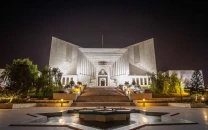At long last, Imran gets bail relief from SC
CJP-led bench grants bail to former PM in eight May 9 riots cases

In a significant relief, the apex court on Thursday set aside a Lahore High Court (LHC) order and granted post-arrest bails to former prime minister Imran Khan in eight different May 9 rioting cases.
These cases, filed after attacks on military installations in the wake of Imran's first arrest on May 9, 2023 in a corruption case, are currently being heard by different anti-terrorism courts (ATCs), which have already found a number of PTI leaders guilty of the unprecedented acts of vandalism.
A division bench of the LHC on June 24 rejected Imran Khan's bail applications in these cases. The LHC had stated that the PTI founder was involved in hatching a conspiracy to attack military installations in case of his possible arrest as three police officials had given testimonies to that effect.
Imran Khan had challenged the order in the Supreme Court, whose three-member bench led by Chief Justice of Pakistan (CJP) Yahya Afridi and comprising Justice Muhammad Shafi Siddiqui and Justice Miangul Hassan Aurangzeb took up the matter on July 29.
After the conclusion of arguments, the bench on Thursday announced its brief order, accepting the former prime minister's petitions against the LHC order. The bench later issued its 4-page order authored by CJP Yahya Afridi on the Supreme Court website.
The order said the main thrust of the prosecution revolves around the allegation that Imran Khan hatched a conspiracy for the commission of the offences.
In this regard, it said, the prosecution drew the court's attention to the ocular statements of three witnesses, as well as electronic media, and argued that these clearly implicate the petitioner and connect him with the commission of the alleged offences.
"When confronted with the grant of bail rendered by this court to [PTI leaders] Ejaz Chaudhary, Imtiaz Mehmood, and Hafiz Farhat Abbas, who were linked to the same occurrence and charged similarly to the present petitioner, the prosecutor responded that the case of the present petitioner was clearly distinguishable and, therefore, the principle of consistency would not apply in the instant bail matters."
The order said the special prosecutor disagreed with the contention that the LHC bench had discussed the merit of the case while rejecting Imran's bails.
"He said it is by now settled that the findings so recorded in a bail granting order are tentative in nature, to be restricted only to the proceedings of bail and are not considered during the trial of an accused."
The order noted that Imran's counsel vehemently opposed the contentions raised by the special prosecutor, stating that the principle of consistency had to be applied in favour of the petitioner.
He argued that all three accusedEjaz Chaudhary, Imtiaz Mahmood, and Farhat Abbaswere charged with alleged criminal conspiracy, and thus the case of the petitioner would surely fall within the domain of parity, which had to be positively considered in his favour.
According to the order, Imran's counsel noted the cases of the present petitioner were on a better footing, in particular, than that of Ejaz Chaudhary, who had been granted bail by the court.
He pointed out that in the case of Ejaz Chaudhry, the investigation had been completed and the trial had commenced, whereas in the case of Imran those stages had not yet been reached, and thus, his entitlement to bail was comparatively stronger.
The court said it had noted the definite findings recorded by the LHC in bail order, "which go to the very root of the contested claims of the parties".
"However, without passing any findings on the legality and veracity of the said findings, our concern at this stage is confined only to the fact that such findings have been recorded at the stage of bail.
While highlighting that any findings passed by the court on the merits of the case might prejudice either party at trial, it noted that it was sufficient to state that the material brought on record regarding the alleged criminal conspiracy required scrutiny.
"And the same [scrutiny] would be best adjudged after recording pro and contra evidence during the trial. In addition, the case of the petitioner has to be positively considered in view of the principle of consistency, as others similarly placed have been granted bail by this court.
"In view of the above, these petitions are converted into appeals and allowed. The petitioner is granted post-arrest bail in the above mentioned cases, subject to his furnishing bail bond in the sum of Rs.100,000 with one surety in the like amount to the satisfaction of the trial court in each case," it said.




















COMMENTS
Comments are moderated and generally will be posted if they are on-topic and not abusive.
For more information, please see our Comments FAQ